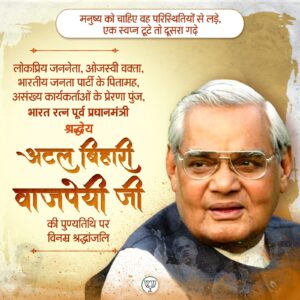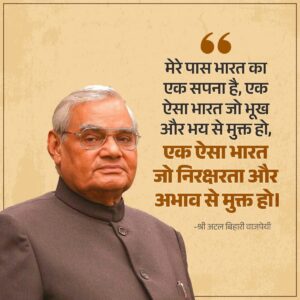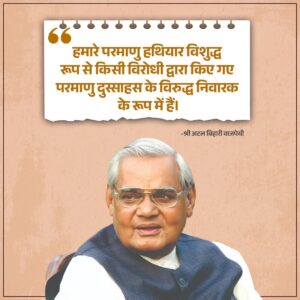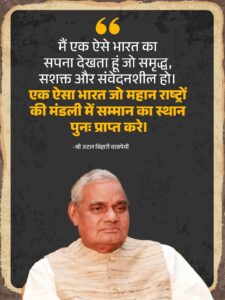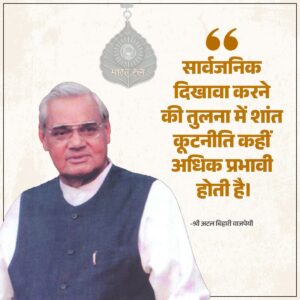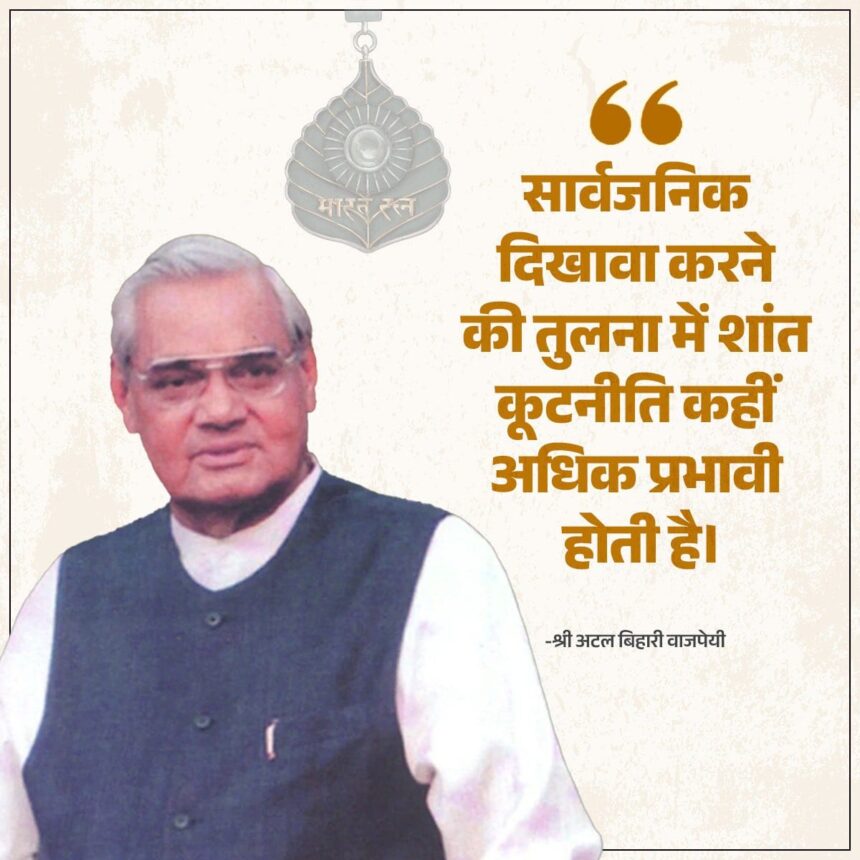Shri Atal Bihari Vajpayee: Biography, Legacy, and Contributions
Shri Atal Bihari Vajpayee was one of India’s most respected leaders, a poet, orator, and politician who played a pivotal role in shaping modern India. His life exemplifies dedication, resilience, and visionary leadership. From his early days in Gwalior to becoming India’s Prime Minister, Vajpayee left an indelible mark on the nation and its people.
- Early Life and Education
- Political Journey
- Timeline of Key Events
- Major Contributions and Achievements
- Fun Facts About Atal Bihari Vajpayee
- FAQs About Shri Atal Bihari Vajpayee
- Significance of Atal Bihari Vajpayee in Daily Life and Society
- Wishing and Honoring Atal Bihari Vajpayee
- Conclusion: Lessons from Shri Atal Bihari Vajpayee’s Life
This comprehensive guide covers his biography, history, facts, timeline, significance, impact on society, and key life lessons.
Early Life and Education
Birth: 25 December 1924, Gwalior, Madhya Pradesh
Family: Born into a Marathi Brahmin family; father was Krishna Bihari Vajpayee, mother was Krishna Devi
Education: Studied at Victoria College, Gwalior, earning a degree in Arts and later a Diploma in English Literature
Early Interests: Vajpayee displayed a passion for poetry, literature, and politics from a young age
He started his career as a teacher and journalist, contributing to newspapers and engaging in debates on national issues, showing early signs of his eloquence and leadership skills.
Political Journey
Early Political Career:
Joined the Rashtriya Swayamsevak Sangh (RSS) in his youth
Became active in the Bharatiya Jana Sangh (BJS), advocating for nationalism and development
Member of Parliament:
First elected to Lok Sabha in 1957 from Balrampur constituency
Served multiple terms as an MP, gaining respect across party lines
Prime Minister of India:
Served as Prime Minister thrice:
First Term: 1996 (briefly)
Second Term: 1998–1999
Third Term: 1999–2004
Known for economic reforms, foreign policy initiatives, and nuclear tests that established India as a global power
Legacy in Parliament:
Famous for his poetic speeches, wit, and ability to unite diverse political groups
Timeline of Key Events
1924: Born in Gwalior
1942: Participated in the Quit India Movement
1957: First elected as Lok Sabha MP
1977: Member of Janata Party government
1996: First term as Prime Minister
1998: Second term; conducted nuclear tests at Pokhran
1999–2004: Third term; focused on infrastructure, education, and national security
2018: Passed away on 16 August, leaving a lasting legacy
Major Contributions and Achievements
Economic Reforms:
Promoted privatization and liberalization policies
Focused on improving infrastructure and telecom sector
Foreign Policy:
Strengthened relations with neighboring countries
Advocated for peaceful coexistence and strategic diplomacy
Nuclear Policy:
Oversaw Pokhran-II nuclear tests, establishing India as a nuclear state
Poetry and Literature:
Wrote numerous poems and speeches that inspired millions
Known for blending politics with literary elegance
Social Initiatives:
Promoted education, rural development, and national integration
Advocated for women’s empowerment and poverty alleviation
Fun Facts About Atal Bihari Vajpayee
He was a gifted poet, writing in Hindi and English.
Vajpayee was known for his sense of humor and eloquence in parliamentary debates.
Despite political differences, he was respected by leaders across party lines.
He loved to travel and often wrote reflections on India’s diverse culture and society.
He was fondly called “Ajatshatru”, meaning one without enemies, reflecting his amicable nature.
Vajpayee played a key role in shaping India’s coalition politics, proving his ability to build consensus.
He often emphasized the importance of morality, ethics, and honesty in public life.
FAQs About Shri Atal Bihari Vajpayee
Q1: When was Atal Bihari Vajpayee born?
A: 25 December 1924
Q2: How many times did he serve as India’s Prime Minister?
A: Three times (1996, 1998–1999, 1999–2004)
Q3: What was his contribution to India’s nuclear program?
A: Oversaw Pokhran-II nuclear tests in 1998, establishing India as a nuclear power
Q4: Was Vajpayee also a poet?
A: Yes, he wrote poetry in Hindi and English and often included literary elements in his speeches
Q5: Why is he called “Ajatshatru”?
A: Because of his ability to maintain cordial relations and avoid unnecessary conflicts
Significance of Atal Bihari Vajpayee in Daily Life and Society
Political Integrity: His life teaches the importance of honesty, ethics, and selfless leadership.
Nationalism and Vision: Inspired citizens to work towards development, unity, and national pride.
Consensus-Building: His coalition politics demonstrates the value of dialogue, compromise, and cooperation.
Literary Influence: Encouraged cultural appreciation and the power of words to inspire change.
Legacy in Governance: His focus on infrastructure, education, and foreign policy continues to influence modern policymaking.
Wishing and Honoring Atal Bihari Vajpayee
On commemorative days or his birth anniversary, people express their respect and admiration:
“Remembering Shri Atal Bihari Vajpayee: A visionary leader whose words and actions continue to inspire generations.”
“May the life of Vajpayee Ji guide us to practice honesty, courage, and selfless service for the nation.”
Such observances encourage reflection on values, leadership, and public service in daily life.
Conclusion: Lessons from Shri Atal Bihari Vajpayee’s Life
Shri Atal Bihari Vajpayee’s life is a testament to courage, intellect, and integrity. His journey from a young poet in Gwalior to the Prime Minister of India demonstrates:
The power of perseverance and dedication
The importance of values, ethics, and selflessness in leadership
The ability to bridge divides and foster unity
How words and ideas can inspire millions
Vajpayee Ji’s contributions continue to influence India’s political landscape, social values, and cultural identity. By studying his life, individuals can learn resilience, leadership, empathy, and national pride—qualities that remain relevant in today’s world.
Shri Atal Bihari Vajpayee remains an inspiring figure, reminding us that true leadership combines vision, integrity, compassion, and courage, leaving a legacy that empowers generations to come.
